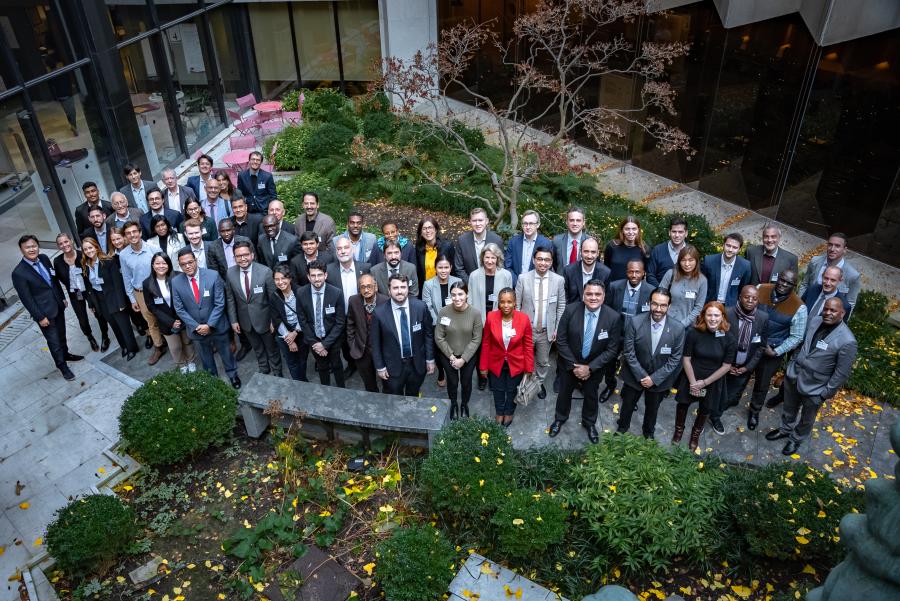A warm THANK YOU for making the First C3A Annual Symposium a success!
 Group photo at the C3A Symposium
Group photo at the C3A Symposium
The First C3A Annual Symposium, held from December 2-6 at the World Bank Conference Center in Paris, was a resounding success and we want to extend a warm thank you to the 150 persons who participated, both in-person and online. The event brought together a distinguished group of experts, practitioners, and leaders from across the globe to discuss and explore ways to advance climate action 10 years after the COP21 Paris Agreement, with a particular focus on the role of Ministries of Finance during the critical mid-transition period. The support and engagement of every attendee were essential in making this Symposium an enriching and impactful gathering that bridged the gap between science and policy. The discussions, knowledge exchange, and innovative ideas that were shared have set the stage for continued collaboration on the urgent issues of climate and nature policy, climate finance, and capacity building.
The Symposium was introduced with an inspiring discussion between Paschal Donohoe, Head of Eurogroup and Martin Wolf, Financial Times, about the role of Ministries of Finance in the transition.
Read Paschal Donohoe's opening remarks or watch the replay below.
 Pachal Donohoe and Martin Wolf at the C3A Symposium
Pachal Donohoe and Martin Wolf at the C3A Symposium
The Symposium’s core theme was the role of Ministries of Finance in advancing climate action, particularly during the transition phase between short-term challenges and long-term sustainability goals. This period is pivotal, requiring carefully crafted policy tools, frameworks, and an understanding of the trade-offs that governments face as they move towards green, inclusive economies. Through engaging discussions and sessions, the Symposium highlighted the critical intersection of science, policy, and climate action, and how Ministries of Finance can serve as crucial drivers in achieving climate goals. As the world navigates the complex path toward decarbonization, it has become clear that Ministries of Finance will need to take on even greater responsibilities. These include assessing the financial implications of climate-related policies, ensuring sustainable investments, and aligning economic growth with environmental protection. The Symposium emphasized that, to successfully navigate this transition, collaboration across sectors and between institutions is more important than ever.
Key Highlights from the Symposium
The Symposium was a 5-days immersive experience, designed to foster learning, interaction, and collaboration through different workshops, roundtable and panel sessions. Here are just a few highlights that made the event so memorable:
- Roundtables and Panel Sessions:
Over 12 highly engaging and productive roundtables and panel sessions were held, each led by distinguished speakers and expert chairs. These sessions covered a wide range of topics, from policy frameworks for climate finance to practical applications for climate action in various sectors. The discussions provided an excellent platform for sharing ideas, learning from each other, and developing strategies to move forward in the face of ongoing global challenges. The diversity of the speakers and the expertise they brought helped generate dynamic conversations that pushed the boundaries of climate discourse.
- Innovative Kiosk Sessions:
The Symposium featured 28 vibrant kiosks, with 15 focusing on policy and analytical tools, and 13 showcasing country-specific experiences. These kiosks were organized in a unique format that encouraged dynamic interactions and fostered deeper engagement in small groups bringing together experts and government representatives. Participants had the opportunity to explore new policy tools, gain insights into innovative strategies, and build meaningful connections with experts, institutions, and peers. This interactive setup sparked new ideas and laid the groundwork for collaboration that will continue well beyond the event.
- Research Sessions Bridging Policy and Academia:
12 thought-provoking research sessions bridged the gap between policy perspectives and academic research. These sessions were the opportunity for researchers to present their papers selected during the call for contribution launched by C3A a few months ago. Papers focused on a wide array of topics, including green industrial policies, fiscal policy in the transition, nature and resource-related transition risks, carbon taxation, and the latest developments in financing instruments in the transition. By connecting policy-makers with academic experts, these sessions provided valuable insights into the most pressing climate issues, leading to stimulating discussions that will influence future climate policy decisions.
- Regional Meetings:
Regional meetings led by our partners from CEPAL, CAREC, and UNECA enhanced participants' understanding of the specific challenges and priorities faced by countries in different regions. These sessions provided a platform for peer learning and the exchange of best practices, strengthening trust and fostering lasting collaborations among attendees. These regional discussions played a critical role in ensuring that the global nature of the Symposium was complemented by relevant, country-specific insights that can shape future climate strategies.
Moving Forward: Continued Collaboration and Momentum
The C3A Annual Symposium was not just an event, but a call to action. The conversations, collaborations, and innovations sparked throughout the week have laid a foundation for continued momentum in the effort to advance climate action and build a sustainable future. The connections made, the knowledge shared, and the new strategies discussed have all contributed to building a stronger, more collaborative global climate community. Looking ahead to COP30, we are excited to see how these discussions continue to unfold in the months to come. We encourage all participants to stay engaged with the C3A community and continue to share knowledge, insights, and resources available on our website. By doing so, we can collectively drive forward the policies and actions needed to achieve a sustainable, resilient, and green future for all.
For those who want to relive the experiences and key moments of the Symposium, we invite you to visit our dedicated Symposium webpage watch our retrospective video.
